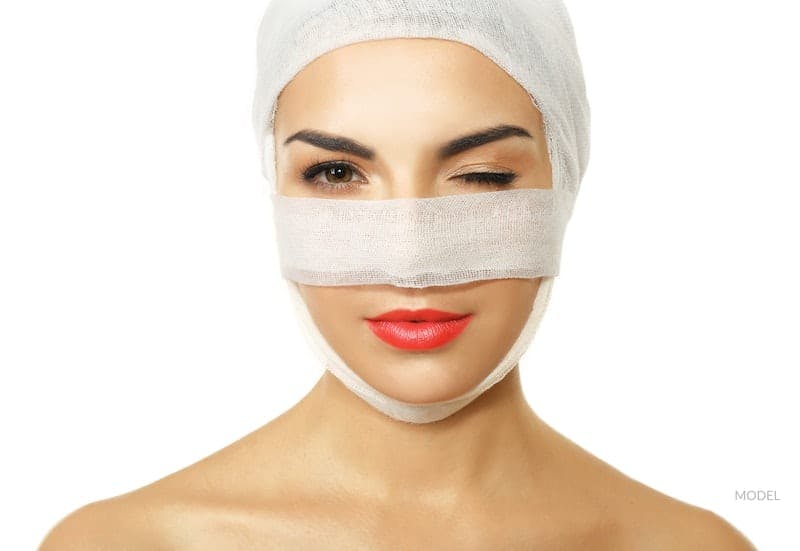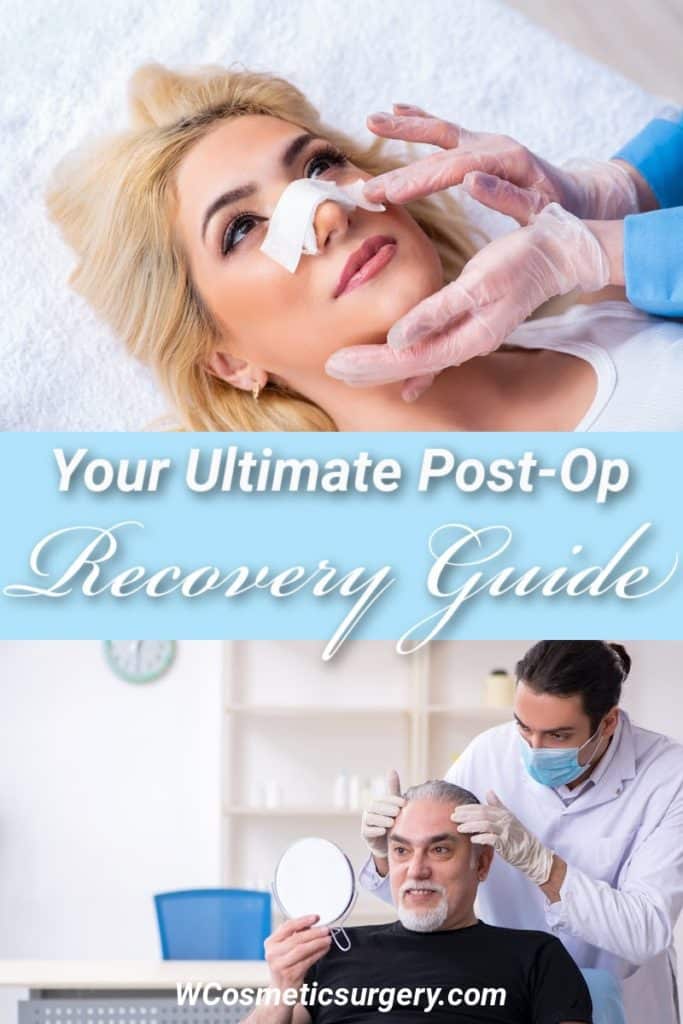
Recently, I wrote about vitamins and nutraceuticals that contribute to a speedier recovery. Some of these are so necessary that, without them, normal healing simply cannot occur. But, are there other ways or shortcutting your healing experience? Many of our patients try to squeeze an aesthetic procedure before a hard deadline—a wedding, a speaking engagement, a TV appearance, etc.—and these patients can’t afford significant downtime. A quick post-op recovery guide is needed by many.
We are intensely aware of this and have learned how to create an environment for a speedy recovery. We refer to this as the rapid recovery experience.
What Is the Rapid Post-Op Recovery Experience?
What Should You Avoid?
Anything that makes blood clotting more difficult—in other words, blood thinners—will cause bleeding during or after the surgery and, therefore, make you more black and blue.
It makes sense to discontinue blood thinners when approved by your primary care provider for a safe period of time before your surgery. For aspirin (even baby aspirin), that period is for two weeks. For nonsteroidals, that period is more like five to seven days.
For medicines deliberately employed to prevent clotting like Coumadin, Xarelto, or Eliquis, etc., a discussion with your doctor is mandatory, as it may not be safe to be off of them. We may need to discuss how to optimize the surgical environment to avoid these issues.

Avoid Certain Supplements
It’s amazing to me now how many supplements patients take in addition to their regular medicines prescribed by their physician.
A 2015 study suggested that 35 percent of those surveyed took supplements in some form, and the number is higher in the elderly and those with physical ailments like arthritis.
Many of these medicines thin the blood, and it can take a tremendous amount of time for them to leave your system—more than the usual 10 days to two weeks your surgeon may recommend prior to your surgery/injections.
We now ask our patients to be off of those supplements for up to a month.
So, what am I talking about?
- Turmeric
- Cranberry
- Aloe
- Ginger
- Ginkgo
- Garlic
- Feverfew
- Fenugreek
- White clover
- Evening primrose
- “Green” antioxidant supplements
- Dong quai
- Oregano
- Saw palmetto
- Flaxseed oil
- Fish oil
- St. John’s Wort
Many of these (ginger, garlic, turmeric) are standard elements of our diets, so it is important to watch what you eat.
Optimize Your Diet: WCosmetic Guidelines
What else should you shun in your diet to expedite healing? Well, it is many of the compounds listed above. In addition, avoid these—especially the evening before surgery!
- Garlic
- Grapefruit
- Green tea, chamomile tea, mint tea
- Oregano
- Anything high in salicylates
We recommend a low salicylate diet.
What Are Salicylates?
Salicylates are chemicals produced by many plants that are related to aspirin. They are thought to be produced by the plants to ward off insects; however, they thin the blood.
Foods high in salicylates include:
- Peppers—cayenne, chili, paprika, etc.
- Avocados, radishes, cucumbers, broccoli, okra, spinach (most vegetables!)
- Raisins, prunes, and apricots (most dried fruits except for bananas!)
- Blueberries, cherries, grapes, plums, pineapples, mangoes, guava, oranges, tangerines
- Watermelon (most fruits!)
- Tomatoes, eggplant, okra (most nightshades)
- Brazil nuts, macadamia nuts, pistachio (most nuts!)
- Coffee
- Curry, garam masala, ginger, mustard, oregano, bay leaf, basil, vanilla, (most spices!)
The ideal diet consists of animal proteins supplemented with low salicylate foods such as bread, bananas, and pears. Unfortunately, that doesn’t sound appetizing—especially to vegetarian and vegan patients. Therefore, we suggest that you avoid spicy foods for a week prior to surgery, especially those with turmeric, peppers, curry, and garlic.
Avoid Smoking
This means smoking anything!
Smoking, regardless of whether it is tobacco or a controlled or non-controlled substance, causes issues with healing. Some surgeons won’t even operate on patients who admit to smoking.
Some surgeries, especially facelift surgeries, can be compromised by smoking, and we recommend avoiding smoking for six weeks before and after surgery.
We go so far as to test our smoking patients at the time of surgery to determine whether tobacco is in their system. We’ve seen compromised flaps in marijuana smokers, which has had long-term effects on their results. Therefore, we suggest stopping all smoking.
What About Vaping?
A study done by Spiegel and recently published in JAMA Facial Plastic Surgery, demonstrated that vaping also compromised wound healing, as vaping causes the constriction of blood vessels. This study even suggested that vaping one e-cigarette was equivalent to smoking a pack of cigarettes per day.
We’ve seen diminished blood flow in patients that only vape vanilla without nicotine, so we discourage all vaping.
What Else Do We Do to Improve Healing and Lessen Bruising?
For our patients who are willing, we suggest the following rapid recovery experience regimen before and after surgery:
If you are not our patient, we suggest speaking with your physician regarding these modalities prior to your surgery.
Hyperbaric Oxygen Therapy
Oxygen in concentrations of 100 percent, administered at levels greater than the pressure of our atmosphere (two to three atmospheres), is useful in treating compromised wounds, such as those in diabetics and patients who have had radiation.
In the mid-90s, we presented our results using these treatments and are convinced that it helps speed healing by providing a rich environment that encourages the growth of capillaries and promotes cell healing. It is antibacterial, and its use enhances the beneficial effects of antibiotics.
We recommend a few treatments after the procedure. Hyperbaric oxygen therapy is administered in a protected environment at one of the wound healing centers in our area.
830 Nanometer Light
The Healite is a light-emitting diode that improves wound healing by increasing blood flow to areas that have been treated with surgery. It acts on the skin, blood vessels, and muscle—all of which are compromised by surgery—and actually penetrates as far as bone. It expedites wound healing and reduces bruising, swelling, and redness.
During this treatment, you bathe in the LED light for 16 minutes. We use it on our patients at every postoperative visit.
Intense Pulsed Light (IPL)
Intense pulsed light is usually used in MedSpas or by your dermatologist to treat redness and brown spots, but it can be used to help us heal as well.
In a study published in the Journal of Plastic and Reconstructive Surgery*, we have shown that intense pulsed light—light amplified using laser technology—speeds bruise resolution by an average of four days. Most MedSpas have this technology, but it is rarely used for this indication.
We use IPL to treat patients who are concerned about the timing and duration of their bruising. Energy from the IPL is applied to the bruise with minimal discomfort on every office visit where a bruise is noted.
*Plastic and Reconstructive Surgery. 137(5):783e–789e, MAY 2016
Hormonal Manipulation
As you would expect, young people tend to heal better than the elderly. While some believe this a result of increased sex hormones, that is still a subject of debate. It also appears that elderly men heal better than women; however, the higher the testosterone level in men, the slower the healing.
We also know that healing is delayed in those with low thyroid hormone levels, so it makes sense to optimize thyroid hormone levels. DHEA—Dehydroepiandrosterone —a compound that is converted to become estrogen or testosterone in the body, facilitates wound healing. We will discuss its uses, benefits, and risks with you before your procedure.
We do not treat endocrine problems with hormones; however, it has been shown that the tissue removed from places where fat is in excess and reinjected into the face in liposculpture—a procedure we perform routinely in isolation or to accompany nearly every aesthetic case –contains elements that stimulate receptors in ways similar to hormones.
Hormonal manipulation stimulates paracrine cells and promotes growth factors and other elements that saturate the treated areas with regenerative and healing benefits. They may allow us to bypass the need for hormonal supplementation by adding and replacing the factors that hormones normally would stimulate the areas where they are most needed—the site of your surgery.
Topicals
If an area is bruised, you can also use topical compounds, such as arnica or Auriderm—a product made by BioPelle containing vitamin K. Both these products, when applied to black and blue areas, may decrease the duration of bruising.
If an area is slow to heal, we may harness the power of Manuka honey—honey produced by bees in New Zealand that pollinate the Manuka bush—that has antibacterial factors that promote healing.
Other Modalities that Reduce Swelling and Enhance Recovery Used at W
See our previous blog about vitamins and nutraceuticals that help recovery.
Injectable Patients
If you are a patient getting injectables, we usually employ topical arnica to diminish bruising and a compound called TXA to diminish bleeding. We treat any bruises with intense pulsed light or the Healite.
Surgery Patients
At the time of surgery, some drugs can be administered that diminish swelling, edema, or bleeding, such as medications that control blood pressure, steroids, and a compound called TXA (tranexamic acid), which makes the oozing seen in surgery diminish.
Postoperative nausea and vomiting can make swelling worse, and it is possible to reduce the possibility of this problem after surgery through the use of certain drugs (Aprepitant, Decadron) and by avoiding the use of other drugs (primarily narcotics).
Postoperative pain can lead to increased blood pressure and can cause swelling, so it is important to keep it monitored and controlled postoperatively. Pain control can be accomplished with nonnarcotic agents and the use of an intraoperative infusion of local anesthetic. This reduces the need for strong pain medications after surgery.
Many of our patients are given medications to reduce blood pressure during the first 24 to 48 hours postoperatively.
Platelet gels and tissue glues are currently being investigated to determine if they are of benefit. So far, the results are promising—they contain factors that promote healing and seem to diminish hematoma, bruising, and swelling.
Drains can be used if bleeding is present, and they have been shown to reduce swelling and bruising.
Interestingly, tight dressings or patches may not be helpful, and so, only light dressings are applied. Ice has been shown NOT TO BE HELPFUL with bruising after eyelid surgery but does work on swelling and redness. We’ve seen frostbite from over-exuberant use of ice—making healing slower—and so we recommend ice compresses be used judiciously.
While we can’t guarantee that any patient will have an experience that is any more rapid than one in which these measures were followed, we believe that an approach that takes these measures and modalities into account should favorably influence the outcome.
IV Vitamin, Amino Acid, and Exosome Therapy
Studies show that supplementation with certain vitamins and amino acids, compounds (such as glutathione), and exosomes (the intracellular elements produced by stem cells) can facilitate the healing of compromised wounds and might fast track and promote healing.
Many of these compounds are available as intravenous agents and can be administered at infusion centers in our area. The research in these areas is sparse, but the excitement that these therapies generate is great, and we will discuss the risks and benefits of treatment with you before your surgery.
Interested in Learning More?
If you have more questions about your recovery, contact Dr. Wulc at W Cosmetic Surgery® by calling (610) 828-8880 or filling out our online contact form.

